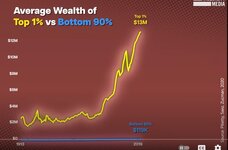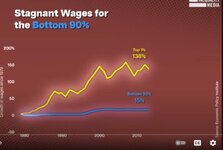No, I am not. The union drives up the price of their labor. The products the company sells become more expensive. As this percolates through the marketplace you'll end up with everything costing more.You are confusing inflation with price. Price is when a CEO, or a union, or a school teacher asks (and gets) higher wages. Price is also when bit coin starts at $1 and goes to $70k. That is NOT inflation. It is NOT inflation because those prices have a chance and (according to Buffet in the case of bit coin) a certainty of also going down again after market exuberance is lost.
If they have enough power the unions can and do cause inflation. They can only benefit by continuing to cause inflation which will hurt everyone. If they quit causing inflation they return to where they were.
In a simplistic world. In the real world it's more complex: by far the biggest factor is how fast money moves. The Fed might print a buck, but the economic effect is determined by how many times that same buck gets spent. Thus the Fed normally does not print money as an economic control, they print money as society needs. The Fed exercises it's control by means of interest rates, not the printing press.Inflation OTOH is the printing of more money in the same pool which dilutes its ability to purchase the same amount of goods. The government legally counterfeits money which causes each existing dollar to be worth less. It may take time for the dilution effect to show up as a higher priced good, but the actual inflation of the balloon happens at the fed level. The fed is solely responsible for inflation. The private entity fed not only counterfeits our currency without going to jail (as you and I would). But then they successfully convince deluded and ignorant people like yourself that inflation is the fault of CEO's, unions, and school teachers..... which it is NOT.
But along came Covid. Economic activity cratered. The Fed turned the interest rate control all the way down and it wasn't enough to keep the market stable. Thus they resorted to the printing press. The Fed is responding to the market, aiming to keep inflation at 2% because deflation is far more harmful than inflation and 2% gives enough wiggle room for the economic cycle.
Your fantasy world of no Fed suffered far greater economic swings than what we have now. Everybody large does something similar to try to keep their economy reasonably stable.
The Fed is quite correctly isolated from a lot of political control so it won't respond to pressure to turn up the economy for political reasons rather than economic ones.


